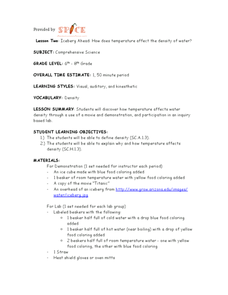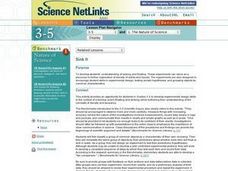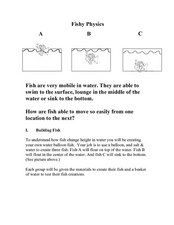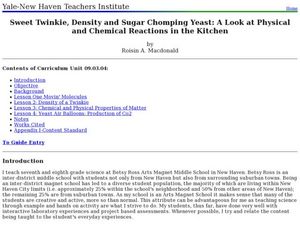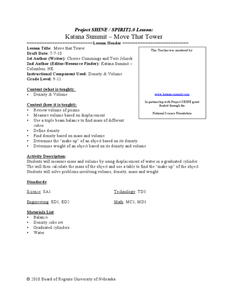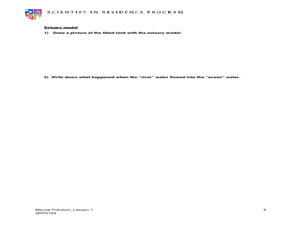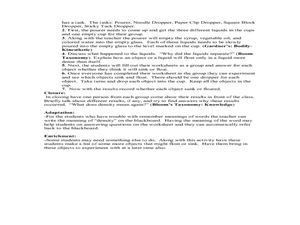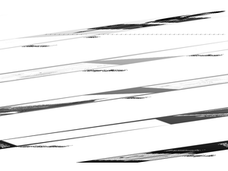Curated OER
Stacking Water
Students experiment with different salinities of water using straws and different colors of water. They collect and interpret data from the experiment.
Curated OER
Iceberg Ahead: How Does Temperature Affect the Density of Water?
Demonstrate how ice floats on water and get the class thinking about why icebergs are so deceiving. Investigators then experiment with mixing water of the same temperature and water of different temperatures. Make sure to explain the...
Curated OER
Galileo's Thermometer: Measuring the Density of Various Unknown Liquids
Sprouting scientists explore the concept of density by making mass and volume measurements for five different liquids. From these measurements, they calculate densities. They apply their learning to explain Galileo's thermometer works...
Curated OER
Chapter 3 ~ Physical Properties of Soil
Though information-packed, this presentation on soil is drab if it stands alone. As you journey through slides about soil texture, make sure to pass around samples of each type. Perform demonstrations as you lecture on soil density and...
Curated OER
Seashore Explorers
There are three separate lessons within this resource that can be used together, or that can each stand alone. In the first, five simple activities allow junior scientists to examine the amazing properties of water. In the second, they...
Curated OER
Introduction to Density
Seventh graders discover the definition of density through a demonstration using ethanol and ice cubes and a class discussion using a SMART Board to illustrate formulas and calculations. Students finish the lesson by practicing...
Curated OER
7th Science Quiz
This seventh grade life science quiz has a professional appearance and well-written multiple-choice questions. However, it seems to cover too broad a variety of biology topics for only 15 questions to fully assess. There is one question...
Curated OER
Ideal Gas Law
In this chemistry worksheet, students write two forms of the ideal gas law. Then they identify the size and units of the ideal gas law. Students also solve the equations for each ideal gas law.
Curated OER
Sink It
Introduce your class to the concept of sinking and floating. In groups, they classify objects after making predictions about which materials will sink or float. They record their results and create graphs and charts to share with the class.
Curated OER
Will It Sink Or Float?
Have your class predict whether objects will sink or float in water. Learners consider a data table of mass, volume and whether the object sank or floated. They develop an evidence-based explanation for the results.
Curated OER
Fishy Physics
Learners explore how fish are able to move easily from one depth to another in water. In this fish instructional activity students create their own balloon fish.
Curated OER
Sweet Twinkies, Density and Sugar Chomping Yeast: A Look at Physical and Chemical Reactions in the Kitchen
Students investigate matter. In this physical science lesson plan, students will learn about matter, physical states, and reactions. There are a series of four lab activities that will be conducted.
Curated OER
Chemquest: Physical Changes or Chemical Reactions
Students explore physical and chemical changes. For this chemistry lesson plan, students will go outside to observe changes seen in nature. Students will then work in the lab to identify changes at different stations prior to doing a...
Curated OER
Density
Students determine the density of different substances. In this physical science lesson, students rank them according to their density. They discover the relationship between volume and density.
Curated OER
Build Your Own Submarine
Students construct their own submarine following a certain procedure. For this physics lesson, students calculate the density of objects using a mathematical formula. They explain why some object floats in water while some do not.
Curated OER
Water
Students conduct a series of investigations on the unique properties of water. In this general science lesson, students explain what causes water's surface tension. They explain the different stages in the water cycle.
Curated OER
Ice Floats
Students explore the changing density of water. In this physics lesson plan, students investigate how an object's density determines whether it will float or sink in water. They explain why this unique property of is important to living...
Curated OER
Move that Tower
Students investigate ways to find the density of irregular shaped objects. In this physics lesson, students calculate density using its mass and volume. They explain why some objects float or sink in water.
Curated OER
Applied Science - Physics Pre-Lab
Students observe fluid motion. In this Physics lesson, students explore the principles of Pascal, Archimedes, and Bernoulli. Students list their experiences with fluid movement.
Curated OER
Modeling Estuaries
Students create a model estuary. In this modeling estuaries lesson plan, students identify characteristics and mix water of varying densities. Students form a hypothesis, conduct an experiment, and analyze the results.
Curated OER
Liquids: Floating and Sinking
Third graders conduct an experiment. In this floating and sinking liquids lesson, 3rd graders discuss density and investigate it using syrup, vegetable oil and colored water. Students observe the results and complete a worksheet.
Curated OER
Hot Air Balloons
Students examine how a hot air balloon works. In this hot air balloon lesson, students do an experiment to test the effects of heat on density. Students make their own hot air balloon and act out how nitrogen moves when turned to a liquid.
Curated OER
Why Do Certain Things Float, While Some Sink?
First graders conduct an experiment. In this density lesson, 1st graders work in groups to test 10 different objects to see which ones sink and float. Students discuss why certain objects float and others do not.
Curated OER
Big Enough?
Students explore the concept of density and buoyancy. In this physics lesson, students discover the different factors that affect an object's density and buoyancy in water. Students conduct several investigations to further understand...



